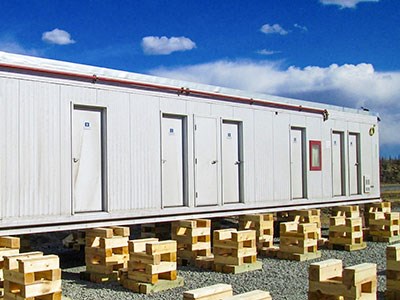A First Nation-owned construction company is cutting its teeth on a new gold mine project under development in northwestern Ontario.
Onikaajigan Construction Limited Partnership is running a 600-man camp for the construction workforce that’s building New Gold’s Rainy River open-pit gold mine, 65 kilometres northwest of Fort Frances.
It’s a temporary work camp at this point, said Onikaajigan’s general partner, Dean Bethune, with the eventual aim of transitioning it into a slightly smaller version since New Gold hopes to source most of its permanent mining workforce of 600 locally instead of flying them in.
The Atkinson Road camp in Chapple Township, which is five kilometres from the mine property, is a typical work camp setup with kitchen facility, recreation centre and portable dorms, soon to number 15 as the construction workforce at the mine begins to peak to between 750 and 800 people.
Of the total camp staff of 56, about 70 to 80 per cent is Aboriginal labour, including the camp management, maintenance and security attendants.
Onikaajigan incorporated about two-and-half-years ago to provide economic and employment opportunities for First Nation members in mining.
There is no president as it is run under a partnership of three very progressive owners.
Onikaajigan — which Bethune said roughly translates in Ojibway to “design-build” — is a three-way ownership group involving Naicatchewenin and Rainy River First Nations (45 per cent each) and Saulteaux Consulting and Engineering (10 per cent).
The limited partnership models are pretty standard business arrangements for First Nations to provide tax breaks and limited liability of the partners.
Naicatchewenin and Rainy River First Nations signed an impact-benefit agreement with New Gold, which included overseeing the camp operation.
Onikaajigan basically acts as the general contractor in managing the camp and catering to smaller supply needs for the mine project.
“We don’t employ a lot of people,” said Bethune, “but when we put a dorm up it’s at least 25 per cent First Nation labour.”
Onikaajigan joint ventures with more than 40 partners ranging from local to large national companies, including Sodexo, which provides the camp catering and housekeeping services.
Onikaajigan handles much of the smaller maintenance and contracting jobs related to the project, including the construction of New Gold’s administration building and the mine dry facility.
“The two buildings we did were roughly $8 million, which is considered small since the actual construction value of the mine is $880 million,” said Bethune.
Onikaajigan is also tasked with handling New Gold’s fuel needs, concrete and safety product supply, and fencing, along with providing cultural training through Seven Generations Education Institute in Kenora.
“The big thing for us will be the camp and fuel supply, long-term,” said Bethune. “It doesn’t sound like much but fuel is about 40-million litres a year.”
To further reduce their risk, their inventory of equipment is kept to a minimum.
Anything needed for a specific job is either leased or bought on a short-term basis and then sold.
“There are a lot of things that are too short term to get into,” said Bethune. “That’s why we have to be careful with these mining projects. We can buy equipment then have to get rid of it, depending on the market.
“Anything we need, we rent, and then we work with partners who have whatever we need.”
Much of the trades training for their mebers are arranged through their partners and other contractors working at the mine site.
With a stagnant regional economy, Bethune said it makes no sense investing in training for short-term jobs during the construction phase.
“This is Fort Frances. This is about the only thing we’ve done in the last 20 years.
“Our goal is to get as many people as we can employed at the mine because that’s sustainable for us in the long term.”
The camp operation is not the only iron they have in the fire.
Bethune said they’re “working on a number of endeavours” involving “big partners with lots of cash and ability. We’re looking at one job of $30 million with a couple of partners,” not related to the New Gold project.
“There’s nothing that we won’t tackle.”
Many of their partners want to combine Onikaajigan and Saulteaux’s proven ability to run projects as well as build ties with First Nations.
On a multi-million-dollar project the size of New Gold, Bethune said they further fill a support role for contractors through back office work by handling all the budgeting, cash flow and reporting paperwork.
“It’s been a really good fit for us because a lot of the local companies wouldn’t be able to work on the project if it weren’t for us.”
The federal budget and its emphasis on building community infrastructure on Aboriginal reserves may open a few more doors, he said. “We’ve worked on over 300 houses on First Nations, designing, building and overseeing those projects. It opens up an opportunity for us, if we have time,” he laughed.




